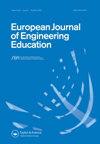同行评估、自我评估和结果反馈:可行性和可靠性的检查
IF 2.8
Q2 EDUCATION & EDUCATIONAL RESEARCH
引用次数: 2
摘要
自我评估和同伴评估被认为是加深对复杂概念理解、增强元认知能力和支持学习者自我效能感的有效策略。本研究调查了在大学工程课程中完成的同伴和自我评估练习相关的数据(n=61)。分析了与同行评估分数、自我评估分数和专家评估分数相关的数据。在同行评估活动中产生的反馈的质量也被考虑在内。手稿中包含一个开放数据集,并托管在开放科学框架上。本研究的结果表明,与专家评估相比,同行评估的可靠性相对较高,尽管同行评分往往被高估。与专家评估分数相比,自我评估分数的可靠性相对较低。在同侪评估过程中提供的反馈的质量与学生的表现密切相关。讨论了进一步改进和在更大队列中实施的建议。本文章由计算机程序翻译,如有差异,请以英文原文为准。
Peer assessment, self-assessment, and resultant feedback: an examination of feasibility and reliability
ABSTRACT Self and peer assessments have been identified as effective strategies to develop a deeper understanding of complex concepts, enhance meta-cognitive capacity, and support learner self-efficacy. This study examines data related to peer and self-assessment exercises completed within a university engineering programme (n=61). Data related to peer-assessment scores, self-assessment scores, and expert assessor scores are analysed. Quality of feedback generated during the peer assessment activity is also considered. An open data set is included within the manuscript and hosted on the Open Science Framework. The results of this study suggest relatively high peer-assessment reliability when compared to expert assessments, although peer scoring tends to be consistently overestimated. In contrast, self-assessment scores demonstrate relatively low reliability when compared with expert assessor scores. The quality of feedback provided during the peer assessment exercise demonstrated a strong relationship with student performance. Recommendations for further refinement and implementation with larger cohorts are discussed.
求助全文
通过发布文献求助,成功后即可免费获取论文全文。
去求助
来源期刊

European Journal of Engineering Education
EDUCATION & EDUCATIONAL RESEARCH-
CiteScore
7.30
自引率
13.00%
发文量
64
期刊介绍:
European Journal of Engineering Education is published six times a year in print and electronic editions and provides an essential forum for dialogue between researchers and specialists in the field of engineering education, at European and worldwide levels. European Journal of Engineering Education is the Official Journal of SEFI, the Socièté Européenne pour la Formation des Ingénieurs (the European Society for Engineering Education). SEFI is a non-governmental organization whose aims are to develop information about engineering education, to improve communication and exchange between professors, researchers and students and to promote cooperation between the various institutions concerned with engineering education.
 求助内容:
求助内容: 应助结果提醒方式:
应助结果提醒方式:


